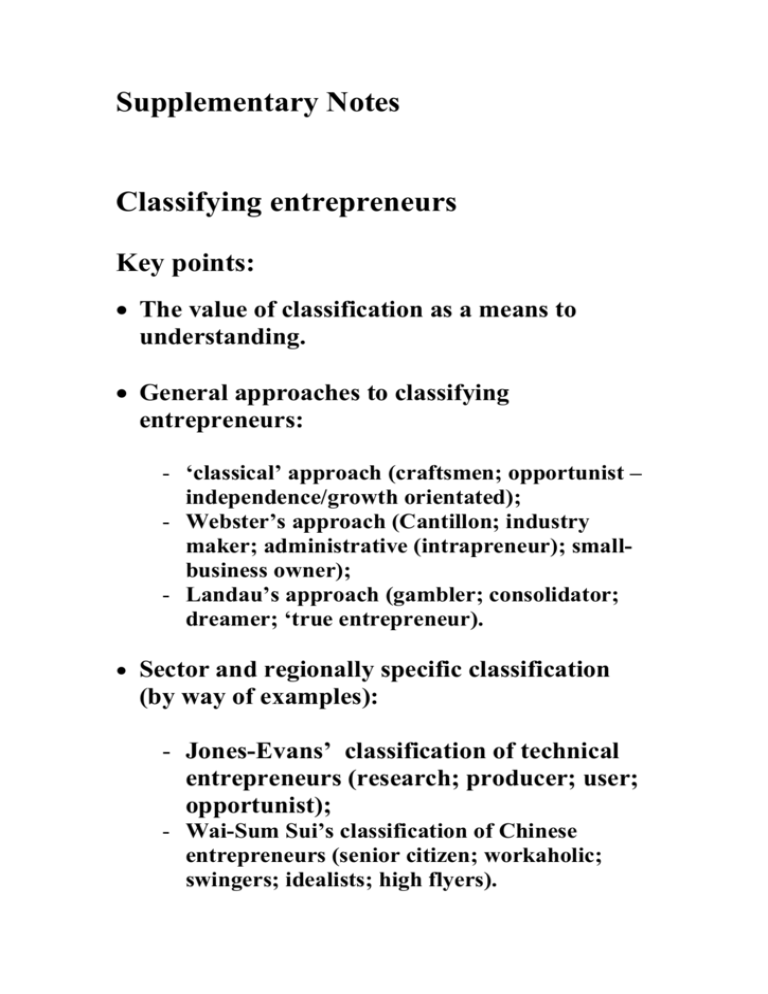Classifying entrepreneurs
advertisement

Supplementary Notes Classifying entrepreneurs Key points: The value of classification as a means to understanding. General approaches to classifying entrepreneurs: - ‘classical’ approach (craftsmen; opportunist – independence/growth orientated); - Webster’s approach (Cantillon; industry maker; administrative (intrapreneur); smallbusiness owner); - Landau’s approach (gambler; consolidator; dreamer; ‘true entrepreneur). Sector and regionally specific classification (by way of examples): - Jones-Evans’ classification of technical entrepreneurs (research; producer; user; opportunist); - Wai-Sum Sui’s classification of Chinese entrepreneurs (senior citizen; workaholic; swingers; idealists; high flyers). Classification is a tool to aid understanding, not a rigid category that entrepreneurs must be shoehorned into. Serial entrepreneurship Key Points: Serial entrepreneurship and entrepreneurial motivation (the job rather than just the rewards). Two types: sequential (one business after another); portfolio (a collection of businesses at the same time). Types of serial entrepreneur (defensive; opportunist; group creating – organic/deal making). What does serial entrepreneurship suggest about entrepreneurial motivation? Cognitive aspects of entrepreneurship Key points Cognition is the study of the human acquisition, storage, processing and retrieval of information and its impact on decision making; Cognitive processes: perception; problem solving; task; Cognitive styles (types and categories of cognitive approaches) and strategies (cognitive approaches to specific problems); Need to consider cognitive processes when understanding entrepreneurial decision making (contrast to economic rationality). Entrepreneurship and small business management: A distinction Key points: Importance of the distinction (manager motivations; strategy; economic role; support issues). Concern with distinguishing between the small business and the entrepreneurial venture rather than the small business manager and the entrepreneur. Key features distinguishing the entrepreneurial venture from the small business: - innovation (entrepreneur pursues global innovation whereas small business pursues local innovation); - growth potential ( high for entrepreneurial venture; low or only moderate for small business); - strategic objectives (small business has (short to moderate time-span) financial objectives; entrepreneurial venture has long-term financial objectives and strategic objectives – market share, market dominance, industry creation, etc.). The distinction between the small business and the entrepreneurial venture does not say who is an entrepreneur and who is ‘just’ a small business manager. These terms are purely personal epithets. Entrepreneurship: A style of management Key Points: Entrepreneurship is, fundamentally, a style of management. Entrepreneurs are characterised by the way in which they do things, not what they do or who they are. Three characteristics distinguish entrepreneurial management from ‘ordinary’ management: - Focus on change - A focus on opportunity - Organisation-wide management Entrepreneurship: A style of management Key Points: Entrepreneurship is, fundamentally, a style of management. Entrepreneurs are characterised by the way in which they do things, not what they do or who they are. Three characteristics distinguish entrepreneurial management from ‘ordinary’ management: - Focus on change – entrepreneurs make a significant difference; conventional mangers are more likely to be interested in incremental change. - A focus on opportunity – entrepreneurs are interested in pursuing and exploiting significant opportunities. They will expose (investor’s) resources to risk in order to do this. Conventional managers are more likely to be interested in conserving resources and limiting the risk they are exposed to. - Organisation-wide management – entrepreneurs are concerned with managing their venture as an integrated whole. Though they have an interest in functional areas of management, they may not explicitly distinguish different functional areas. Conventional managers (up to the level of the CEO anyway) will have an interest in a particular functional area. Entrepreneurship: A style of management Key Points: Focus on change – entrepreneurs make a significant difference; conventional mangers are more likely to be interested in incremental change. A focus on opportunity – entrepreneurs are interested in pursuing and exploiting significant opportunities. They will expose (investor’s) resources to risk in order to do this. Conventional managers are more likely to be interested in conserving resources and limiting the risk they are exposed to. Organisation-wide management – entrepreneurs are concerned with managing their venture as an integrated whole. Though they have an interest in functional areas of management, they may not explicitly distinguish different functional areas. Conventional managers (up to the level of the CEO anyway) will have an interest in a particular functional area.








